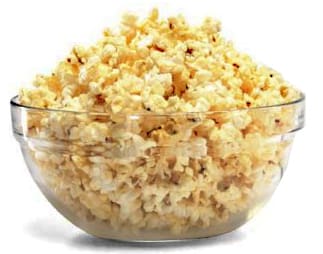Popcorn has received a bucketful of bad press in recent years—movie popcorn in particular—but a new study confirms that popcorn has some surprisingly good nutritional qualities.
 We’ve known for some time that popcorn is an abundant source of fiber, and that it has some B vitamins and minerals such as manganese, magnesium, iron, zinc and phosphorous. But now we’re learning its major benefits come from popcorn’s antioxidant properties.
We’ve known for some time that popcorn is an abundant source of fiber, and that it has some B vitamins and minerals such as manganese, magnesium, iron, zinc and phosphorous. But now we’re learning its major benefits come from popcorn’s antioxidant properties.
A team of researchers from the University of Scranton (Pa.) ran a lab analysis on several types and brands of popcorn and found that popcorn’s crunchy hull is rich in polyphenols—antioxidants that prevent damage to human cells. Polyphenols are also believed to have disease-fighting properties.
The popular snack actually contains more polyphenols than fruits and vegetables.
The popcorn study results were presented last weekend at a meeting of the American Chemical Society in San Diego.
“The hull is where the most nutritional goodies (polyphenols) are — not the white fluffy part,” said chemistry professor Joe Vinson, senior author of the study, which was partially funded by a popcorn company.
Polyphenols are concentrated in hulls because popcorn doesn’t have a lot of water and because it’s 100% whole grain. Some other foods that have polyphenols, such as fruits and vegetables, contain a lot more water. Another plus: popcorn is usually minimally processed.
Polyphenols are strong antioxidants and responsible for protecting body from various dangerous diseases and conditions. Polyphenols are thought to be much more potent antioxidants than Vitamin C and Vitamin E. These antioxidants provide several important health benefits such as protection from coronary artery disease, protection from cancers, healthy blood sugar levels and prevention from premature aging.
“People thought it was just the fiber that made popcorn a healthful choice, but in my opinion, it’s the combination of fiber and polyphenols,” Dr. Vinson said.
Popcorn has an antioxidant called ferulic acid that’s also found in beans, corn, rice, wheat, barley and many other grains. Ferulic acid has shown a wide range of therapeutic effects against cancer, diabetes, cardiovascular and neuro-degenerative diseases (Alzheimer’s) largely because of its strong antioxidant and anti-inflammatory activity.
Of course, people shouldn’t count on getting all their fiber and polyphenols from popcorn. It shouldn’t be considered a replacement for fruits and vegetables, Vinson cautions.
On the down side, movie theater popcorn remains a high-calorie choice. A small unbuttered popcorn at the Cineplex typically contains more than 650 calories, a large has about 1,200.
Kantha Shelke, a spokeswoman for the Institute of Food Technologists and a food chemist in Chicago who has studied popcorn, says an occasional splurge of lightly buttered popcorn at the movies is okay. “Popcorn drenched in butter or oil is bad. Sprinkled or sprayed and consumed in moderation is good for both the body and the soul,” she says.
Not to mention all that fiber and those polyphenols. Let’s go see “The Hunger Games!” We can eat broccoli tomorrow.
For more insights and innovations check out CultureWaves®, the place to go for the latest observations in the World Thought Bank – events, ideas, trends and more. Add your own thoughts about anything in life – entertainment, design, technology, well-being and, yes, food trends. And, take a look at a few of our other Hot & Cool Food Trends.

